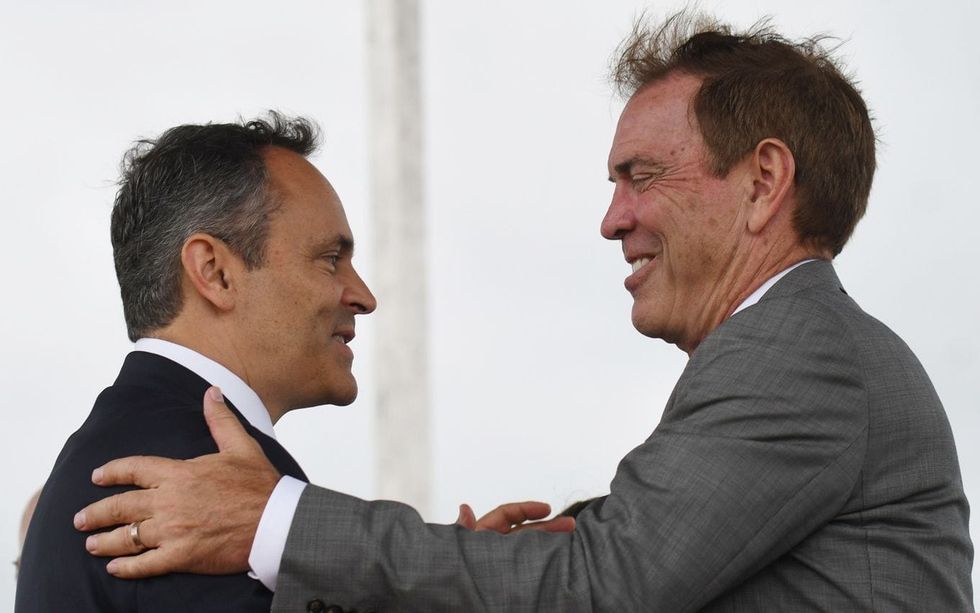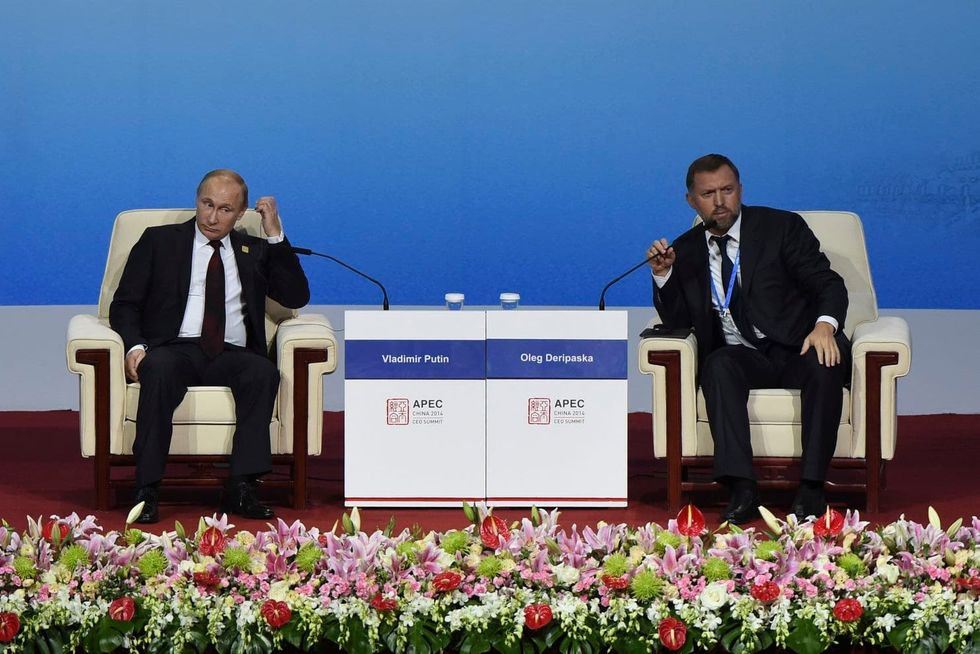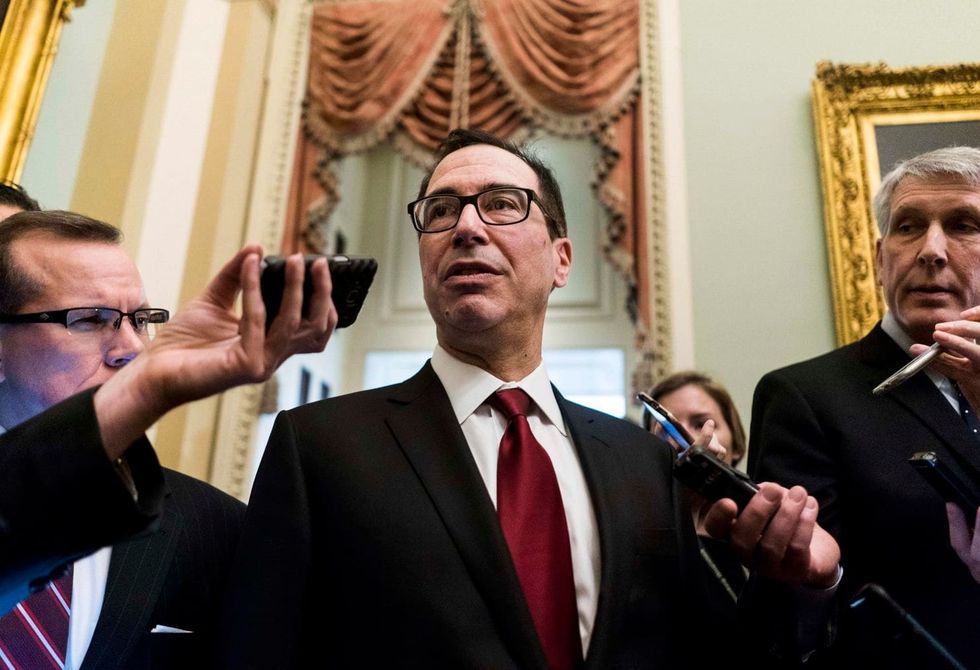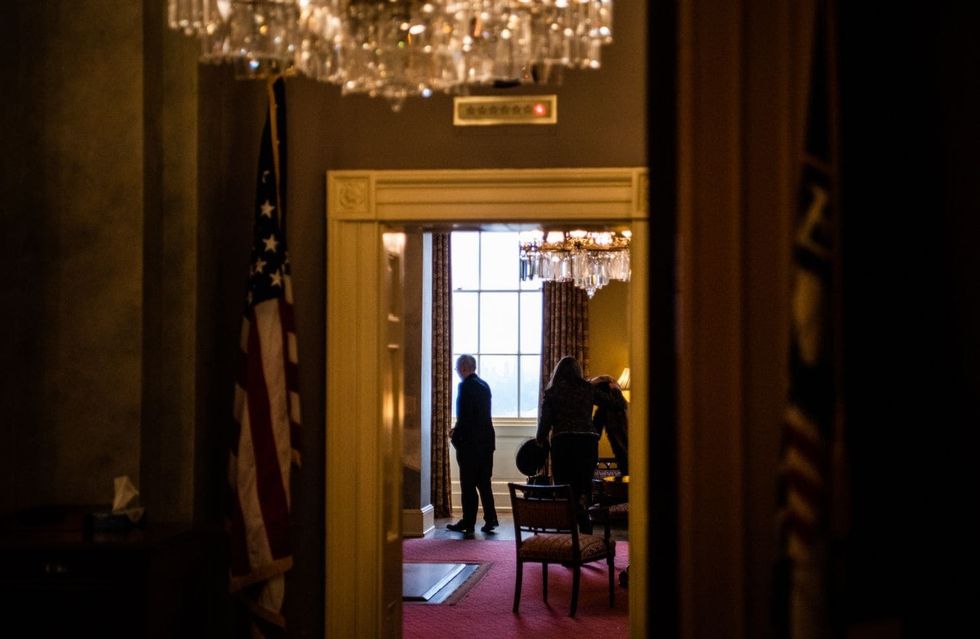In January, as the Senate debated whether to permit the Trump administration to lift sanctions on Russia's largest aluminum producer, two men with millions of dollars riding on the outcome met for dinner at a restaurant in Zurich.
On one side of the table sat the head of sales for Rusal, the Russian aluminum producer that would benefit most immediately from a favorable Senate vote. The U.S. government had imposed sanctions on Rusal as part of a campaign to punish Russia for "malign activity around the globe," including attempts to sway the 2016 presidential election.
On the other side sat Craig Bouchard, an American entrepreneur who had gained favor with officials in Kentucky, the home state of Senate Majority Leader Mitch McConnell. Bouchard was trying to build the first new aluminum-rolling mill in the United States in nearly four decades, in a corner of northeastern Kentucky ravaged by job losses and the opioid epidemic — a project that stood to benefit enormously if Rusal were able to get involved.
The men did not discuss the Senate debate that night at dinner, Bouchard said in an interview, describing it as an amicable introductory chat.
But the timing of their meeting shows how much a major venture in McConnell's home state had riding on the Democratic-backed effort in January to keep sanctions in place.
By the next day, McConnell had successfully blocked the bill, despite the defection of 11 Republicans.
Within weeks, the U.S. government had formally lifted sanctions on Rusal, citing a deal with the company that reduced the ownership interest of its Kremlin-linked founder, Oleg Deripaska. And three months later, Rusal announced plans for an extraordinary partnership with Bouchard's company, providing $200 million in capital to buy a 40 percent stake in the new aluminum plant in Ashland, Ky. — a project Gov. Matt Bevin (R) boasted was "as significant as any economic deal ever made in the history of Kentucky."

A spokesman for McConnell said the majority leader did not know that Bouchard had hopes of a deal with Rusal at the time McConnell led the Senate effort to end the sanctions, citing the recommendation of Treasury Secretary Steven Mnuchin.
McConnell "was not aware of any potential Russian investor before the vote," spokesman David Popp said.
Bouchard said no one from his company, Braidy Industries, told anyone in the U.S. government that lifting sanctions could help advance the project. Rusal's parent company, EN+, said in a statement that the Kentucky project played no role in the company's vigorous lobbying campaign to persuade U.S. officials to do away with sanctions.
But critics said the timing is disturbing.
"It is shocking how blatantly transactional this arrangement looks," said Michael McFaul, who served as the U.S. ambassador to Russia during the Obama administration and now teaches at Stanford University.
Democratic senators have called for a government review of the deal, prompting a Rusal executive in Moscow last week to threaten to pull out of the investment.
The Rusal-backed project is one of several issues fueling broader scrutiny of McConnell's posture toward Russia and its efforts to manipulate American voters.
In 2016, McConnell privately expressed skepticism about the intelligence reports on Russia's activities in the election and resisted a push by the Obama administration to issue a bipartisan statement condemning the Kremlin. Last month, he blocked consideration of election security bills that have bipartisan support, despite warnings from the FBI and the intelligence community about the risks of foreign interference in the 2020 election.
Democrats have accused McConnell of being unwilling to stand up to Russian President Vladimir Putin, taunting him with the moniker "Moscow Mitch." The critique has drawn an angry response from the usually understated majority leader.
"I was called unpatriotic, 'un-American' and essentially treasonous by a couple of left-wing pundits on the basis of boldfaced lies," McConnell said late last month. "I was accused of 'aiding and abetting' the very man I've singled out as our adversary and opposed for nearly 20 years: Vladimir Putin."
A McConnell aide declined Tuesday to comment on discussions that occurred in a classified setting in 2016 but noted that the senator signed a bipartisan letter that fall requested by the Obama administration that warned state election officials about the risks of cyberattacks and urged them to be especially vigilant as Election Day approached.
McConnell has said since then that he supports efforts to improve election security and has budgeted more money for the effort but does not agree with proposals that would give the federal government control over election issues that traditionally have been handled by states.
The controversy shows how Russia's surreptitious 2016 activities, rather than uniting U.S. officials, have left Democrats and Republicans bitterly divided — and have triggered heated debate about Russian investments in American businesses.
"You just can't be so picky," said Bouchard, who sold a Midwestern steel company he previously owned to another Russian company. He now says politics shouldn't get in the way of a good deal for Kentucky: "Whoever is going to help us go in and rebuild this place that's been decimated, we just welcome it, with open arms."
But in Kentucky, some leaders are questioning the wisdom of partnering with a Russian company recently punished by the U.S. government.
"Rusal is not okay," said Kelly Flood, a Democratic state legislator from Lexington who said she regrets a 2017 vote to invest $15 million of state taxpayer money in the project. "It's not okay that we're turning to Deripaska, given the damage he's done to our democracy. . . . Rusal's reputation is now ours."
An attorney for Deripaska did not respond to a request for comment. He has denied being beholden to the Kremlin.
"While I realize I've involuntarily become a lightning rod for the anger some Americans have about the elections result, they need to look elsewhere for a scapegoat," Deripaska told The Washington Post in February. "I am nobody's man, in Russia, the U.S. or anywhere else, for that matter."
A promise for Appalachia
In Ashland, a city of 22,000 wedged along Kentucky's border with West Virginia and Ohio, there has been enthusiasm for the Braidy Industries project, a venture the company says will bring as many as 650 new high-paying jobs to a region hit hard by the impending closure of a major steel mill and the decline of coal mining.
A promise for Appalachia
In Ashland, a city of 22,000 wedged along Kentucky's border with West Virginia and Ohio, there has been enthusiasm for the Braidy Industries project, a venture the company says will bring as many as 650 new high-paying jobs to a region hit hard by the impending closure of a major steel mill and the decline of coal mining.
Bevin, who in his bid for reelection is blasting Democrats as socialists, has fielded criticism that he steered the government to buy stock in a private company.
"This is a handout. This is a giveaway," said Jim Waters of the Bluegrass Institute for Public Policy Solutions, a free-market think tank. He said he understood the desire to create jobs in a hard-hit region; some impact studies show the mill could indirectly result in thousands of new jobs. But, Waters added, "I think the excitement of that overrode some of the due diligence."
A spokeswoman for Bevin did not respond to a request for comment. State officials have said the investment will make Kentucky more competitive to attract high-wage, high-tech jobs in the future.
In a 2017 radio interview, Bevin said he thought the Braidy project would be "transformative."
"That's going to be one of the best investments the state has ever made," he said.
Early on, the Kentucky project apparently caught the attention of Rusal, which is the world's second-largest aluminum producer.
A top Rusal executive told Bloomberg News in an interview in June that the project was "discussed long before Rusal was sanctioned."
"We just had to put the talks on hold after sanctions," he added.
An EN+ spokeswoman said the early conversations about the Kentucky project were all internal. She declined to comment further.
Bouchard said he was talking to other possible investors for the project from the time the company first announced it would build in Kentucky in 2017. But he insisted they did not include Rusal — and said that a partnership with the Russian company was not even on his radar when the Treasury Department announced sanctions about a year later, in April 2018.
"Not even a thought," he said.
The sanctions allowed the government to freeze any Rusal assets in the United States and made it illegal for Americans to do business with the company.
At a groundbreaking for the mill a couple of months after the sanctions were announced, Bouchard and other speakers emphasized that the project would produce American-made aluminum sheets.
"This is what hope feels like," Bevin said at the event, according to a video posted online, adding, "We are Kentucky."
But Bouchard said he encountered an unexpected problem: With aluminum ore in short supply, he was having trouble finding smelters with the capacity to produce enough raw material for his plant. He said he traveled the world, meeting with Rusal's competitors, but was able to find only 60,000 tons of raw aluminum to purchase. He needed more.
In late December, he said, an aluminum industry consultant alerted him to a new low-carbon smelter that Rusal was building in Siberia. Bouchard said he quickly concluded that the Rusal plant, set to open in 2021, could produce the aluminum Braidy needed.
At that point, he said, he became convinced that a partnership with Rusal would be a dream deal, providing his company with much-needed capital and access to raw aluminum. But sanctions, he said, stood in the way.
Bouchard said he contacted his attorneys for advice. They were clear: He could talk to Rusal, but he could not legally conduct negotiations with the company while sanctions were in place.
That same month, the Treasury Department announced plans to lift sanctions on Rusal. But Congress still had a chance to block the move.
Bouchard said that by the time of his January meeting with the Rusal executive in Zurich, he knew the sanctions could be ending. Still, he said, he thought the final decision could be months or years away.
On the night of his dinner in Zurich, which was first reported by Time magazine, the outcome of the sanctions debate remained uncertain, with some Republicans expressing concerns about the plan.
Over the meal, Bouchard said, he told his Rusal counterpart: "Look, I don't know what's going to happen with sanctions. . . . I don't know if it's a month or 10 years, but if the day comes and sanctions go away, I'd love to meet again."
EN+ declined to comment on the dinner.
Rolling back sanctions
In April 2018, after the poisoning of a Russian former spy in England, the United States imposed sanctions on some Russian entities, including Deripaska and his companies. "Russian oligarchs and elites who profit from this corrupt system will no longer be insulated from the consequences of their government's destabilizing activities," Mnuchin said in a statement.
A U.S. diplomatic cable from 2006, published by WikiLeaks, referred to Deripaska — who founded Rusal and had financial ties to Paul Manafort, the now-jailed former Trump campaign chairman — as "among the 2-3 oligarchs Putin turns to on a regular basis."

In announcing the new sanctions, the Treasury Department noted that Deripaska had been investigated for alleged money laundering and accused of "threatening the lives of business rivals" and having ties to organized crime. The U.S. government has not accused Deripaska of personal involvement in Russia's interference in the 2016 election.
Deripaska sued the U.S. government earlier this year, alleging that the sanctions relied on "false rumors and innuendo and originate from decades-old defamatory attacks by Deripaska's business competitors" and have led to the "utter devastation" of his reputation and economic well-being. He told CNBC in March that he thought the sanctions represented the "weaponizing of the financial system" and that they crushed "all concept of presumption of innocence and fair process."
The sanctions caused Rusal's stock price to plummet and disrupted the international aluminum market, drawing complaints from some U.S. trading partners.

In December, Mnuchin said the Trump administration was prepared to lift sanctions imposed on Deripaska's companies, while keeping sanctions on Deripaska personally, to restore order to the international aluminum market.
He said that Deripaska had agreed as part of the deal to reduce his ownership stake in the companies he once controlled.
"These entities are undergoing significant restructuring and governance changes that sever Deripaska's control and significantly diminish his ownership," Mnuchin said in the statement. "If these companies fail to comply with the terms, they will face very real and swift consequences."
Members of Congress were skeptical.
"There are too many open questions about whether Deripaska will still control the companies," Rep. Eliot L. Engel (D-N.Y.), chairman of the House Foreign Affairs Committee, said in January. "With the threat that Russia poses to the United States, to our friends and allies, to democracy around the world, Congress cannot just look the other way when the administration rushes a decision like this."
With strong Republican support, the House on Jan. 14 overwhelmingly rejected the administration plan to lift sanctions, 362 to 53.
But the effort failed in the Senate, thanks in part to McConnell and strong lobbying efforts.
The effort to lift sanctions was led by Lord Gregory Barker, the new British chief executive of EN+, and included Republican ex-senator David Vitter of Louisiana, now a lobbyist at Mercury Public Affairs, according to public lobbying records.
Vitter and Mercury warned that failure to lift Rusal sanctions would "open the Trump administration up to criticism for harming U.S. manufacturers and consumers," according to lobbying records. Vitter was spotted in McConnell's office days before the vote.
Michael Crittenden, a spokesman for Mercury, said the Braidy project "categorically" did not figure into the company's sanctions lobbying. He declined to comment on whether anyone at Mercury knew there was a possibility that Rusal might invest in the project if sanctions were lifted, citing a company policy about not commenting on client matters.
Just before the vote, Minority Leader Charles E. Schumer (D-N.Y.) warned the Senate that providing sanctions relief "gives Vladimir Putin exactly what he wants" at a time that "Russia continues to run rampant over international norms, to meddle in democratic elections, and to destabilize the world."
McConnell called Schumer's resolution "a political stunt." And he rejected claims that he or others in the GOP were soft on Putin.
"We Republicans are hardly strangers to the need for strong policies concerning Russia," McConnell said on the Senate floor. "We have long seen Vladimir Putin for the KGB thug that he is."
At McConnell's urging, the measure was defeated on Jan. 16, falling three votes short of the required three-fifths majority needed to overcome a threatened filibuster.
Joining in opposition was Kentucky's junior GOP senator, Rand Paul.
A spokesman for Paul said the senator was unaware of the prospect of a major Rusal investment in Kentucky at the time and said he voted against the measure because he opposes sanctions against Russia, Iran and North Korea as a matter of principle.
"We were not involved, consulted or aware of any investment discussions with any foreign entity" before the sanctions vote, said Kelsey Cooper, Paul's communications director.
Similarly, McConnell said he was not motivated by any Kentucky interests.
"It was completely unrelated to anything that might happen in my home state," McConnell told reporters at the Capitol in May. "A number of us supported the administration. . . . And that's — that was how I voted — the reason I vote the way I did."

A new partnership
Less than two weeks after that January vote, the Treasury Department announced that it had accepted Rusal's plans to limit Deripaska's control over the company and removed sanctions.
Four weeks later, Rusal executives were in Ashland, touring Braidy's mill site. By April, the new partnership was announced. As part of the deal, Barker, the British head of Rusal's holding company, will become co-chairman of Braidy Atlas, the company that will operate the mill.
Bouchard, who said he had watched the Senate sanctions vote live on television, was thrilled.
"For me, to this day, this is one of the greatest things that's ever happened to northeast Kentucky — Rusal saying yes to our deal," Bouchard said. "Particularly if you think about Appalachia and what's happened there — you know, those people today are jumping up and down and welcoming them, Rusal, because they're helping rebuild the community."
With sanctions lifted, EN+ is "exploring and acting on strategically expanding our global partnership and opportunities, including in the United States," the company said in a statement.
EN+ is "the only global producer capable" of supplying Braidy with the low-carbon aluminum it had been seeking, and a result, "the whole project would not have been possible without Rusal's investment," the company said.
Despite the 2018 groundbreaking, Bouchard agreed that getting the mill open would have been difficult without Rusal. "It would have imposed upon us a real challenge that would have been tough," he said.
Braidy is gathering additional investors and hopes to be listed on the New York Stock Exchange or Nasdaq. The company plans to begin producing aluminum sheets by September 2021.
In Ashland, Braidy has opened a headquarters in a downtown office building, but it has not yet begun building on its site, city officials said.
And some lawmakers are voicing concern about Rusal's role, including Rep. James Comer (R-Ky.), a McConnell ally who has clashed with Bevin and criticized state investment in a project whose prospects he said appear uncertain.
"I hope we can get some jobs there. But it's not looking real good for this business," Comer said in a television interview in April. "I would have not taken the Russian money if I was a start-up."
On Friday, the chief financial officer of Rusal said during an earnings call reported by Bloomberg News that the company could pull out of the project if U.S. officials continue applying pressure on the company.
The comment was an apparent reference to recent efforts by Democratic senators, led by Ron Wyden of Oregon, to secure a review of the Kentucky deal from the U.S. government agency charged with examining national security implications of foreign investments.
Barker issued a statement from London, saying Rusal's parent company "remains committed" to the project. Bouchard, in a separate statement, accused the media of "taking an active role in trying to undermine" a project that could create many jobs.
Wyden rejected such complaints, saying he and several Senate colleagues were pushing ahead on a request for a review of the Russian investment.
"The national security of the United States is more important than the preferences of a Russian company," Wyden said Sunday in a statement. "I'm not going to let up because Rusal finds oversight inconvenient."
—-
Washington Post, August 14, 2019
Tom Hamburger is an investigative reporter on the national desk of The Washington Post. He has covered the White House, Congress and regulatory agencies, with a focus on money and politics.
Rosalind Helderman is a political enterprise and investigations reporter for The Washington Post. She joined The Post in 2001.
###
August 15, 2019
Voices4America Post Script. The Washington Post article did not use the cover picture above. Perhaps it should.
Did I mention war hero #AmyMcGrath can beat #MoscowMitch if we help her! #McGrath4KY

